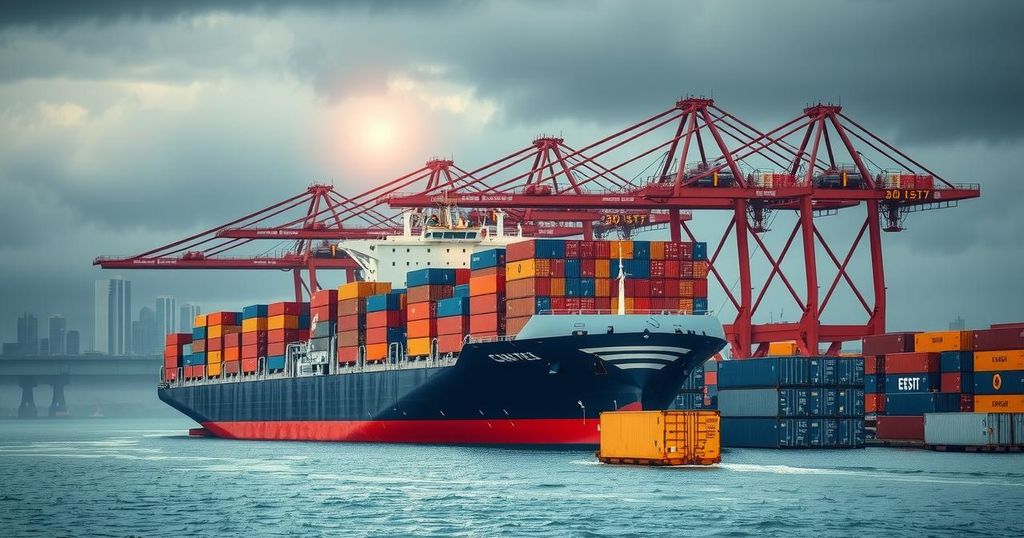Trump’s Trade War Triggers Retaliatory Tariffs from Canada and Mexico
The trade war initiated by President Trump through hefty tariffs on imports from Canada, Mexico, and China has elicited swift retaliatory tariffs from Canadian Prime Minister Justin Trudeau and Mexican President Claudia Sheinbaum. Canada will impose 25% tariffs on $155 billion worth of American goods, while Mexico adopts a cautious stance. The ongoing conflict has generated public outcry, economic concerns, and political ramifications as both nations brace for potential trade disruptions.
Following President Donald Trump’s unexpected imposition of extensive tariffs on imports from Canada, Mexico, and China, retaliatory measures have swiftly been enacted by Canadian Prime Minister Justin Trudeau and Mexican President Claudia Sheinbaum. In response to Trump’s tariffs, which included a 25% levy on Canadian and Mexican goods and 10% on Chinese imports, both leaders convened discussions, ultimately deciding on counter-tariffs.
Prime Minister Trudeau has publicly declared that Canada will impose 25% tariffs on American goods, amounting to $155 billion. Canada’s targeted products include alcohol, furniture, and citrus juices, alongside broader sentiments encouraging Canadians to reconsider purchases from the United States. Conversely, President Sheinbaum has taken a more measured approach, announcing retaliatory tariffs without specifying rates or products yet.
In Ontario, Premier Doug Ford announced the removal of American liquor brands from government store shelves, asserting that $1 billion in annual sales of American alcoholic beverages would cease. Local authorities intend to follow suit, with some Canadians expressing their discontent by advocating for alternatives to American products on social media.
Trudeau emphasized the implications of the tariffs, stating, “We don’t want to be here. We didn’t ask for this. But we will not back down.” Meanwhile, Texas Governor Greg Abbott retorted, highlighting Texas’s substantial economy compared to Canada’s. This rising tension has prompted Canadians to voice a sense of betrayal towards their former allies, with manifestations of irritation evident during National Hockey League games, where the American anthem was met with boos.
As Mexico navigates its political landscape, officials are preparing for potential repercussions from the tariffs. Despite prior hopes for diplomacy reminiscent of 2019, recent accusations towards Sheinbaum’s administration necessitate a firmer stance against U.S. policies. Mexican public sentiment identifies the need for respect and classification as an equal partner rather than as a national security threat.
Economic experts in Mexico are sounding alarms over potential consequences stemming from the tariffs. Gabriela Siller warned of an impending “economic crisis,” projecting increased unemployment and price hikes as likely outcomes. In light of this potential downturn, it may become necessary for the Mexican government to engage in countercyclical fiscal policies to mitigate adverse effects.
Amidst these developments, historical perspectives have prompted Canadian leaders to argue that Mexico, not Canada, is primarily responsible for trade tensions. Claims asserting the resilience of the Canadian populace resonate among officials, with Premier Doug Ford delineating that the underlying issues lie elsewhere, particularly pertaining to the Mexican border and broader trade relations with China.
As Canada approaches a pivotal election cycle, Trudeau’s Liberal Party is set to announce its new leader on March 9, exerting pressure to respond decisively to the tariffs. Stakeholders are deeply concerned that the imposed tariffs violate existing trade agreements, necessitating a strong economic response, one that Mark Carney, a leading candidate to succeed Trudeau, has also publicly voiced, reinforcing the sentiment that “Canada will not bow down to a bully.”
The article addresses the escalating trade conflict initiated by President Donald Trump’s unilateral imposition of tariffs on Canada, Mexico, and China. Trudeau and Sheinbaum’s retaliatory measures reflect a broader sentiment among North American allies towards protectionist policies that disrupt established trade agreements. This trade war presents significant economic ramifications for both Canada and Mexico, which rely heavily on trade with the U.S. As political tensions rise, the article outlines various responses from local leaders and the implications for cross-border trade relationships.
In summary, the trade war initiated by President Trump has spurred significant retaliatory actions from both Canada and Mexico, highlighting the complexities of interdependence amidst rising nationalism. The imposition of tariffs has catalyzed a chain reaction of economic strategies and public sentiments in both nations, with leaders committed to defending their economic interests. As both countries grapple with the ramifications of this trade dispute, the potential for further escalation looms, underscoring the need for diplomatic negotiation and collaboration.
Original Source: apnews.com








Post Comment